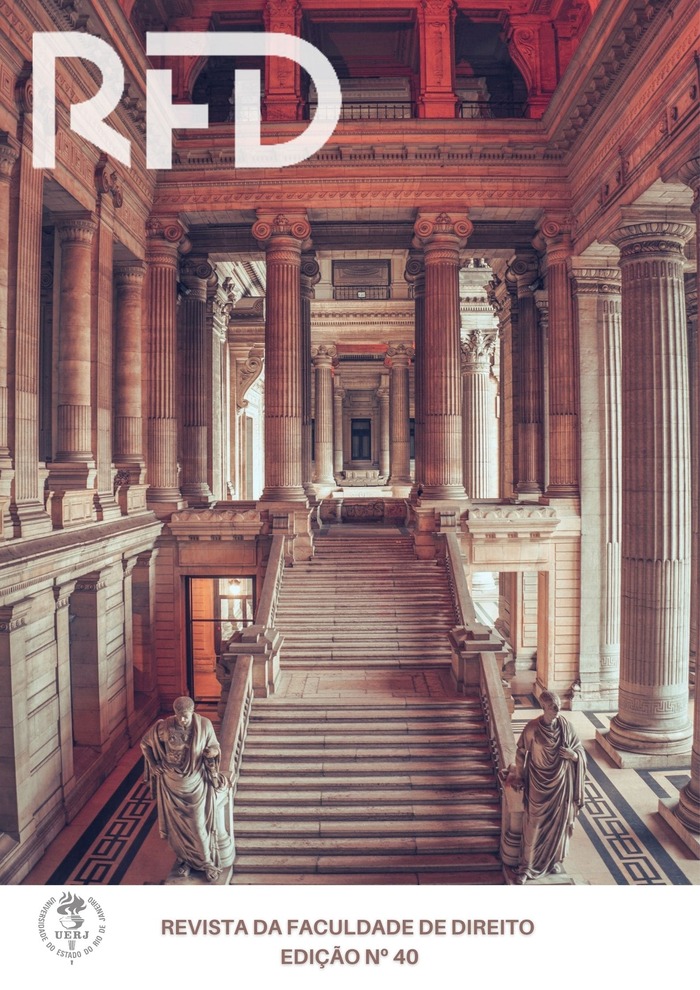1984 E O DIREITO À PRIVACIDADE: RUMO À DISTOPIA?
DOI:
https://doi.org/10.12957/rfd.2021.48882Palavras-chave:
Privacidade, George Orwell, Literatura, Sociedade de Informação, Internet.Resumo
O crescente avanço tecnológico promovido pela internet trouxe para a sociedade contemporânea, no âmbito do direito à privacidade, desafios e mudanças que os métodos convencionais de hermenêutica e interpretação jurídica não são capazes de acompanhar. Assim, verificando a necessidade de aplicação de novos métodos, o objetivo do presente trabalho, a partir da perspectiva da literatura, é analisar o direito à privacidade sob a ótica da obra “1984”, escrita por George Orwell e, com isso, traçar um paralelo entre a sociedade real e a distopia exposta no livro, explorando o conceito de sociedade de informação e expondo os perigos que as novas tecnologias podem causar quando utilizadas sem limitação ou respeito aos direitos fundamentais. Para tanto, utiliza-se de pesquisa qualitativa, com foco no método dedutivo, que é demonstrado na revisão bibliográfica de obras jurídicas, para traçar uma análise do conceito de privacidade; e indutivo, apresentado na análise do livro 1984 e na correlação traçada entre seu conteúdo e a sociedade contemporânea.Downloads
Publicado
Como Citar
Edição
Seção
Licença
Direitos Autorais
oArtigos publicados na Revista da Faculdade de Direito da UERJ (RFD/UERJ)
Os Direitos autorais dos artigos publicados pertencem à Revista da Faculdade de Direito da UERJ (RFD/UERJ). É permitida a reprodução total ou parcial dos artigos desde que citada a fonte.
oReprodução parcial de outras publicações
Artigos submetidos que contiverem partes de texto extraídas de outras publicações deverão obedecer aos limites especificados para garantir originalidade do trabalho submetido. Plágio em todas as suas formas constitui comportamento antiético e é inaceitável.
Recomenda-se evitar a reprodução de tabelas e ilustrações, extraídas de outras publicações. O artigo que contiver reprodução de uma ou mais tabelas e/ou ilustrações de outras publicações só será encaminhado para análise se vier acompanhado de permissão escrita do detentor do direito autoral do trabalho original para a reprodução especificada na Revista da Faculdade de Direito da UERJ (RFD/UERJ). A permissão deve ser endereçada ao autor do trabalho submetido. Em nenhuma circunstância a Revista da Faculdade de Direito da UERJ (RFD/UERJ) e os autores dos trabalhos publicados nesta revista repassarão direitos assim obtidos.
·Os trabalhos não aceitos para a publicação serão devolvidos aos autores, se solicitado.
A Revista da Faculdade de Direito está licenciada com uma Licença Creative Commons Atribuição 4.0 Internacional.
Este trabalho está licenciado sob uma Licença Creative Commons 4.0, Atribuição-Sem Derivações.
Esta licença permite copiar e redistribuir o material em qualquer suporte ou format para qualquer fim, mesmo que comercial, desde de que citada a autoria original.











